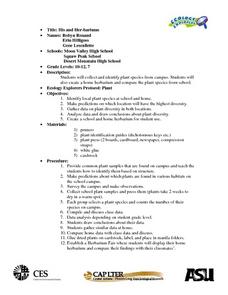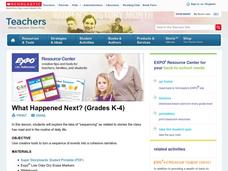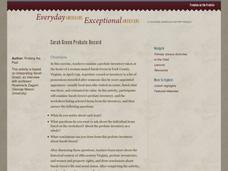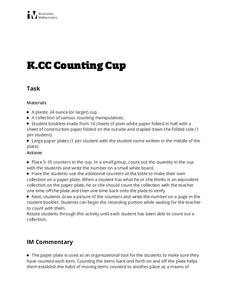Civil War Trust
Map the Civil War
Mapmaking was a very important element in successfully planning attacks on enemies during the Civil War. Guide pupils through the process of pacing to find the average length of their steps, measure the distance between one object to the...
Curated OER
Stack It Up!
Young scholars analyze and begin to design a pyramid. Working in engineering teams, they perform calculations to determine the area of the pyramid base, stone block volumes, and the number of blocks required for their pyramid base. They...
Curated OER
Tell Me More
Fifth graders demonstrate research techniques in addition to endeavoring to display focus and stay on topic. Using books and stories, they gather, organize, and share information about a topic. Additionally, they explain to the class...
Curated OER
I Am Special and You Are Special Too #4
The students listen to a book about being different and investigate that everyone is different, but special in their own unique way. The students draw a picture of themselves using multi-cultural markers. Along with the drawing, the...
Curated OER
Science: Her-bariums Galore!
Young scholars collect and identify plant species and construct herbariums both at school and at home. By gathering data from both locales, they draw conclusions and make predictions about plant diversity. Upon completion of the...
Curated OER
Where are Koalas on the Food Chain?
Take a field trip to observe Koalas, absolutely! Budding scientists become familiar with the Koala's position in the food chain. They answer questions based on what they see and draw a food chain explaining the Koalas position. Tip: A...
Sargent Art
Picasso and Beyond!
After reviewing the life and art of Pablo Picasso, learners set out to create abstract, cubist, relief portraits. They'll draw, color, paint, and cut out portraits just like the ones Picasso created. The lesson is extremely well written...
Scholastic
What Happened Next? (Grades K-4)
Explore the structure of narrative writing with this fun, collaborative lesson. Start by reading aloud a short story, asking small groups of learners to fill in key events on a large story board prepared on the class whiteboard....
Roy Rosenzweig Center for History and New Media
Sarah Green Probate Record
The proof is in the probate record. Much can be learned about history by investigating old, primary source documents. Class members hone their detective skills by examing the 1759 probate record of Sarah Green. Who was this lady? Was she...
Curated OER
Mini-Lesson Planning for Inferences
Making inferences and drawing conclusions is a key component to successful active reading. Encourage your class to use context clues and prior knowledge to infer different elements of a story, including the setting, plot, and character...
EngageNY
Translations
Learn through constructions! Learners examine a translation using constructions and define the translation using a vector. Pupils then construct parallel lines to determine the location of a translated image and use the vector as a guide.
Curated OER
Microfishing
Students use a simple method to collect living microorganisms from natural and/or artificial environments and develop skills in microscopy, observation, drawing, speculation, hypothesizing, oral presentation, and raising questions.
Curated OER
Wynton's Tune
Students examine the serigraph, "Wynton's Tune," by artist Faith Ringgold. They discuss the painting, listen to jazz music, create a drawing that tells a story inspired by their favorite music, and write sentences describing their artwork.
Curated OER
A Closer look at Oil and Energy Consumption
Upper graders analyze basic concepts about the consumption, importation and exportation of the worlds oil production. They create several graphs to organize the data and draw conclusions about the overall use of oil in the world.
Curated OER
Solar Kit Lesson #1 - Solar Cell Inquiry
Give youngsters the components of a solar-powered electric circuit and turn them loose to figure out how to connect them in order for a light to shine or motor to turn. They compare energy output of a solar panel to that of a battery. On...
Curated OER
How Do Artists Effectively Relate Historic Events?
Students explore African American migration. In this black culture and history lesson, students use a map to identify northern and southern states in which African Americans lived in the 1900s. Students observe and describe objects and...
Curated OER
Kip Pix Studio Deluxe
After reading The Sign of the Beaver, learners utilize Kid Pix Studio Deluxe to draw a picture from one scene in the story. They also compose a description to accompany their scene. A minimum of two paragraphs must be written, using at...
Curated OER
Giving Thanks for Food and Farms
Sarah Stewart’s The Gardener and Food from Farms by Nancy Dickmann display the importance of community farms. After reading these short picture books, class members draw connections between farms and the food we eat each day. As a...
Illustrative Mathematics
Counting Cup
Help your kindergartners develop counting skills using a 24 oz. plastic cup, counting manipulatives, and a paper plate. Start with a small group of learners and place a quantity of counting objects between the range of 5 to 10 into each...
Perkins School for the Blind
Calendar Bingo
While this activity was designed for students with special needs, it could be used with any group learning about the calendar or days of the week. Old calendar pages become the bingo board, and numbers 1 through 31 become the numbers...
Midland Independent School District
Drama
Ten drama lessons are the perfect addition to your language arts or theater class. With a focus on script elements, plot development, and parts of a dramatic story, the lessons guide young playwrights through the steps of telling a story...
Channel Islands Film
Arlington Springs Man: Lesson Plan 1
Learning to craft quality questions is a skill that can be taught. Class members use the Question Formulation Technique to learn how to create and refine both closed-ended and open-ended questions. They then view West of the West's...
Museum of Disability
Don't Call Me Special
Introduce young learners to the idea of disabilities and making friends with children who are different than they are. Using Don't Call Me Special - A First Look at Disability by Pat Thomas, learners are guided through the new vocabulary...
Museum of Tolerance
Influence of Media
We are bombarded with media images expressly designed to influence viewers. Learning how to analyze the intended effects of these images is essential and the focus of an activity that asks viewers to use the provided questions to guide...

























